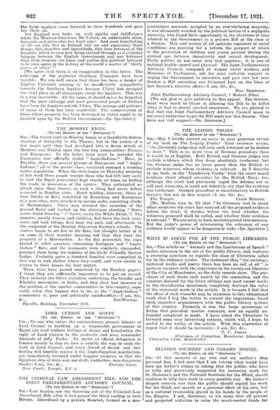THE BOMBAY RIOTS.
[To THE EDITOR OF THE " SPECTATOR."] SIR,—The recent riots in Bombay began as a Gandhi-its demon- stration of disloyalty to the Throne, but in the course of a few hours only they had developed into a fierce attack of Moslems and Hindus upon the two tiny communities—Parsecs and Europeans. In the latter term must be included the Eurasians, now officially styled "Anglo-Indians." Here, in Byculla, there are several groups of Europeans and " Anglo- Indians," all of the poorer class, scattered amongst a teeming native population. When the riots began on Thursday morning of last week these people (except those who had left very early to view the Royal procession) kept closely at home on finding the roads in possession of the rioters. They anticipated no attack upon their houses, as such a thing had never before occurred in Bombay riots. About midday, however, three or four blocks of fiats, inhabited by Eurasians and Europeans of a poor class, were attacked by savage mobs, consisting chiefly of Mahomedans. These men stormed the verandas of the ground floors and rushed up the staircases shouting "Maro, maro, Sated Soor-log" ("Smite, smite the White Swine.") The inmates, mostly women and children, fled down the back stair- cases and took refuge, first near the gaol, and afterwards in the compound of the Bombay Education Society's schools. The rioters began to set fire to the flats, but thought better of it on some of their number shouting out that they were the property of a Malsomedan. As the day proceeded, the riots spread to other quarters containing European and " Anglo- Indian " flats, and the occupants were similarly stampeded, amongst them being the inmates of the Girls' Friendly Society Lodge. Probably quite a hundred families were compelled in this way to seek shelter where they could, and were unable to return to their homes for four nights.
These facts have passed unnoticed by the Bombay papers. I think they are sufficiently important to be put on record. They indicate the bitter racialism underlying the Gandhi and Khalifat movements in India, and they show how insecure is the position of the smaller communities in this country, espe- cially when they happen also to be, as the " Anglo-Indian" community is, poor and politically uninfluesftial.—I am, Sir, Byculla, Bombay, November 2:ith.






































 Previous page
Previous page